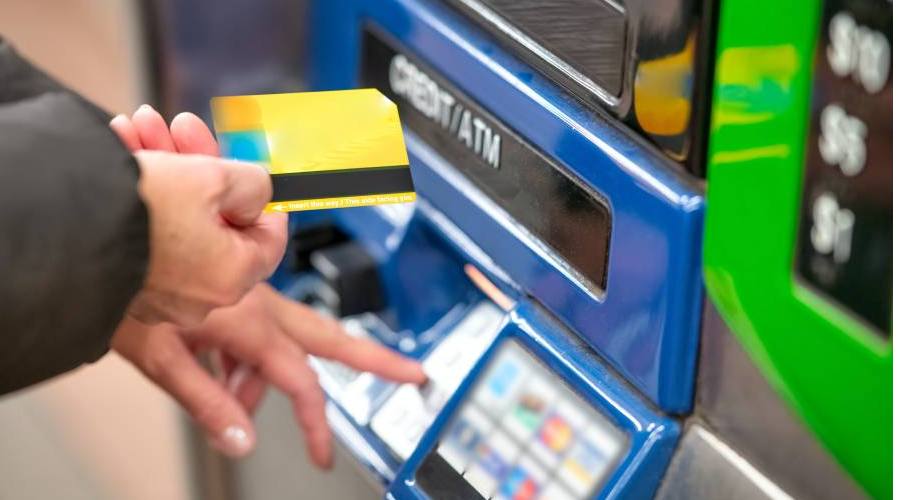Memories of overdue debt do not evoke positive emotions: creditors demand repayment, money problems, constant haste, attempts to re-borrow the required amount, etc.
Many people try to correct the situation by taking out a new loan at another institution or constantly thinking about when will a credit card company sue you, but this only worsens the situation. It is already necessary to pay off two or more personal loans. So, what to do in this case?
Today, there are legal and quite real ways to write off debts, whether an overdue fine on credit card accounts, a student loan debt, debt utility bills, medical bills, federal student loans, or bank loans. Everyone with financial problems can seek help from debt settlement companies and take advantage of debt relief programs.
Find out in this article the best debt settlement services you can trust. You will also find here information about what debt relief is, its advantages and disadvantages, etc.
Debt Relief Companies: Best Offers of 2024
If you want to participate in debt consolidation programs, you need to choose a company that can provide reliable services. The choice can become difficult given the fact that today there are a large number of debt relief options.
To make your search easier, we provide a brief description of the best debt relief companies (CuraDebt, Tally, CutMyDebt, Pacific Debt Inc, Accredited Debt Relief, Freedom Debt Relief, National Debt Relief, and Century Support Services).
Rest assured that you will get what you are looking for and be able to solve your debt problems by contacting any of these debt relief providers.
CuraDebt
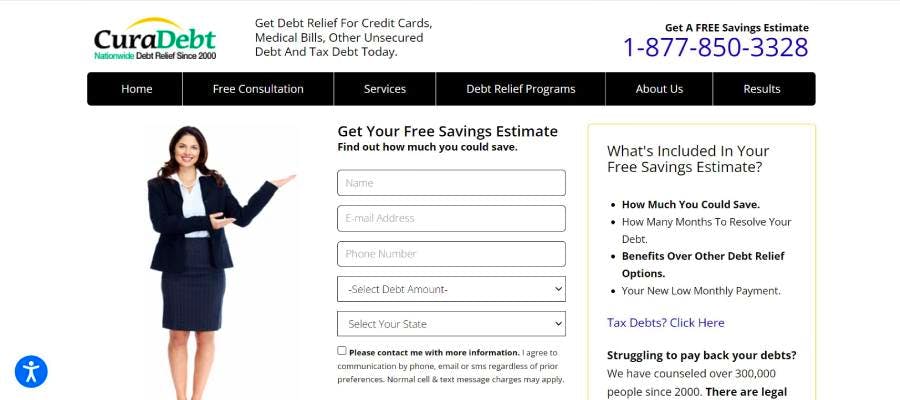
CuraDebt is one of the most popular national debt relief companies today. It was founded in 2000. It is the best for debt settlement and also provides debt consolidation services. You can apply to CuraDebt for debt relief, provided your credit card account debt is $5,000 or more. Fees make up only 20% of the total debt. There is no administrative fee.
CuraDebt offers free credit counseling during which the expert and the client find a solution, for example, such as a loan extension, debt consolidation, etc.
The company has an A+ rating from the BBB for excellent customer service and transparent debt management plans. It is also accredited by the International Association of Professional Debt Arbitrators and the American Fair Credit Council.
Pros of CuraDebt:
- Excellent debt relief services that help pay off unsecured personal loans;
- Free professional credit counseling;
- Low fees.
Cons of CuraDebt:
- Debt settlement program is not available in all US states;
- Personal meetings with credit counselors are possible only in Hollywood and Florida;
- There is no mobile application that would allow you to make debt relief requests more quickly and conveniently.
Despite some cons, CuraDebt is one of the most trustworthy nonprofit credit counseling agencies. Its debt relief options are varied and allow you to deal with credit card debts or any other debts instantly.
Tally
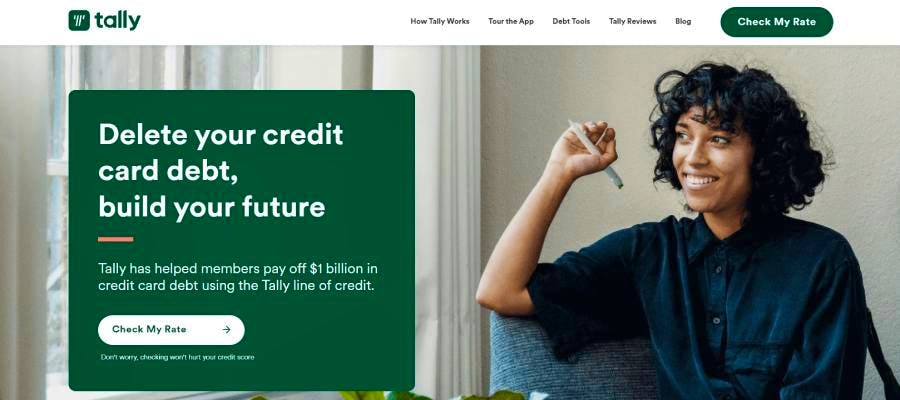
Tally is a mobile application that provides users with debt consolidation services. That is, it allows you to get consolidated debt credit across multiple credit cards. Tally is an excellent choice for those who want to lower the overall interest rate on their payday loans.
It is also chosen by those who do not plan to continue using credit cards after paying off the loan. But most people choose Tally to get help with credit card debt relief.
Tally’s requirements are pretty clear and transparent. The services can be used by those whose credit score is 580 or more. APRs range from 7.90% to 29.99%. Credit line amount: $2,000-$25,000.
Benefits include instant funding, automatic payment of high-interest cards, and no strict credit checks. The downside is that Tally reports payments to major credit bureaus. In addition, the application is paid, and there is a membership fee. The cost is $25 per month or $300 per year.
CutMyDebt
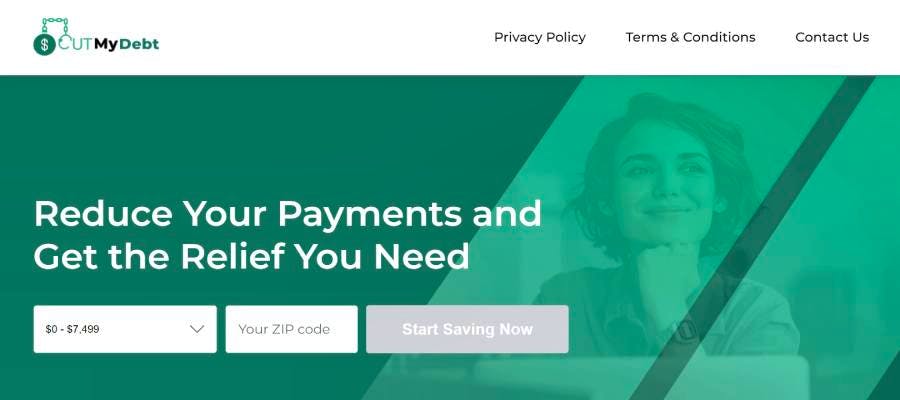
CutMyDebt is also included in the list of the best credit counseling agencies as it is effective in helping you deal with debt, get on the path to financial freedom, and finally get rid of worries. The service works with different types of loans, including credit card debt, bad credit, medical debt, personal loan debt, divorce debt, retiree debt, veteran debt, business debt, etc.
The database of CutMyDebt debt relief experts is quite large. Debt consolidation programs and era debt solutions are varied. Requirements for clients vary depending on the chosen debt settlement company. 15%-25% of the debt settlement fee is usually charged.
Collaboration with clients occurs in three simple steps:
- Get a quote. In the first stage, you need to fill out a simple form indicating what debt free services you need. It takes no more than 5-10 minutes;
- Get connected. At the second step, you are provided with a customized quote tailored to your needs;
- Get help. In the third stage, you get the help you need and solve your financial difficulties through debt consolidation, credit counseling, credit card balances increase, etc.
The main advantage of the platform is the wide variety of services provided.
Pacific Debt Inc
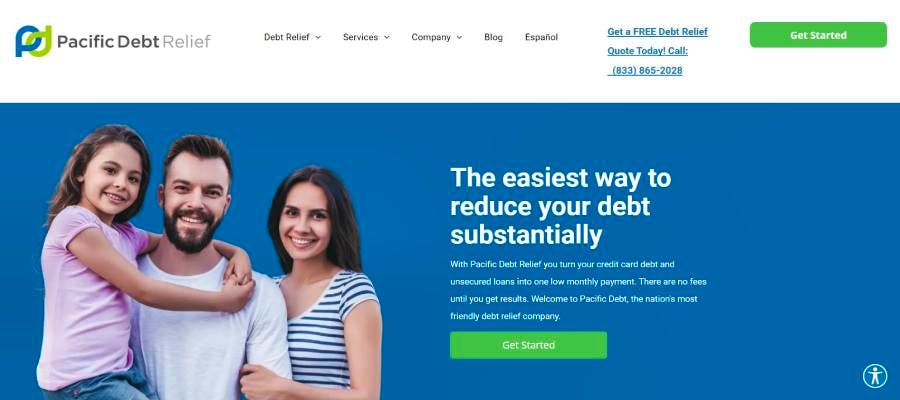
Another effective way to significantly reduce your debt is to contact Pacific Debt Inc. This debt relief company started operations in 2002. During its activity, the company has helped many clients get rid of their unsecured debts and, in total, settled $300 million of debt.
It mainly specializes in assisting those who require personal loan debt relief, payday loan debt relief, credit card debt relief, consumer debt relief, etc. Here are the main ways debt relief is usually provided:
- Consumer credit counseling;
- Debt consolidation loans;
- Credit card debt consolidation;
- Bankruptcy;
- Debt negotiations, etc.
The Pacific Debt Inc, a debt settlement company, is accredited by the Better Business Bureau. It has an A+ rating. In addition, it has an IAPDA certification and is a member of the CDRI. This indicates the reliability of the use of the services provided.
The main advantage of Pacific Debt Inc is that there are no hidden or upfront fees. The service fee varies from 15% to 25% depending on the state and the amount of debt. Those whose debts exceed $10,000 can apply to the company. If your debt is less than $10,000, you will not be able to get debt settlement here.
Accredited Debt Relief
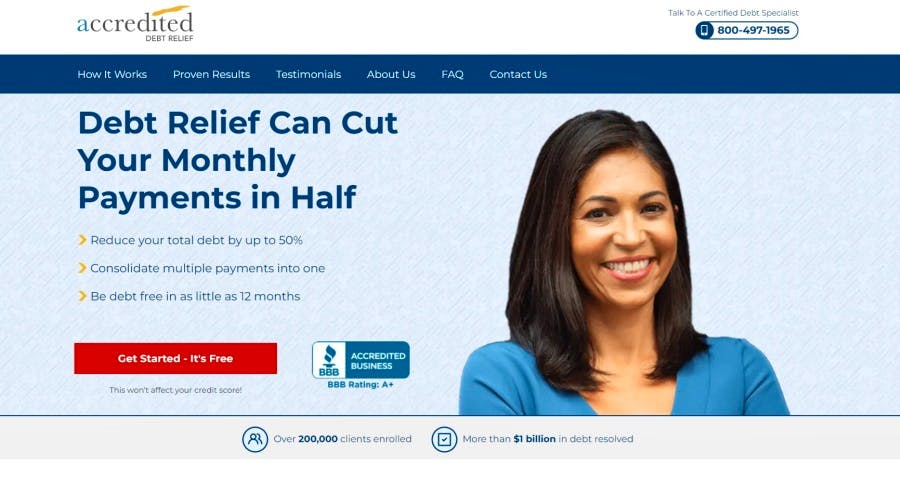
Many people who have unpaid unsecured debt and require an honest debt settlement process with debt collectors turn to Accredited Debt Relief credit counselors for help. And this is not surprising at all since this is one of the best debt relief companies that operate according to a scheme based on efficiency.
Clients only pay fees if the accredited debt relief firm successfully reduces tax debt. The fee usually ranges from 15% to 25% of the total amount of tax debts.
To get debt consolidation or use other debt relief options, you need to have at least $10,000 in debt. It is important to provide the Accredited Debt Relief company representatives with your credit report, as well as documents confirming the level of taxable income.
Like other professional debt arbitrators, Accredited Debt Relief provides free debt settlement counseling and is often successful in negotiating minimum monthly payments with debt collectors. This is its advantage.
The downside is that only those with unsecured debt of more than $10,000 can receive credit consolidation support. There is no mobile app. In addition, credit card debt relief services are not available in every state of America.
Freedom Debt Relief
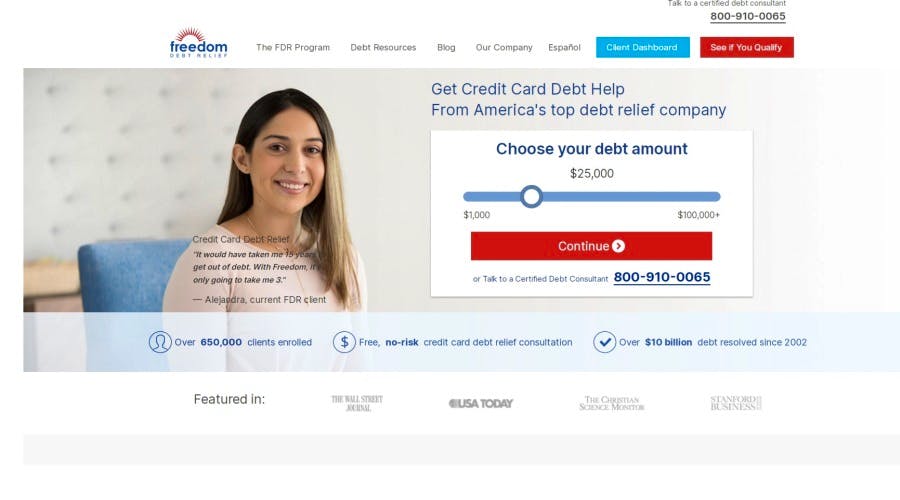
Freedom Debt Relief is one of the most popular and best debt relief companies today. It was founded in 2002 in Arizona. Freedom Debt Relief is BBB-rated and certified by the International Association of Professional Debt Arbitrators, the Federal Trade Commission, and the American Fair Credit Council.
Debt management plans are quite efficient and transparent. It is easy to find out how they suit your case by applying for free credit counseling.
Interest rates are not overstated and make up about 20% of the total debt amount. This explains the high demand for debt relief services provided. The company repays about $15,000 million in tax debts every month. If you need to write off debt faster, the rate may increase slightly. However, there are no upfront fees.
When agreeing to participate in the debt settlement program, it is important to have a debt of at least $10,000 and provide the necessary documentation to debt management professionals. As a rule, these are documents confirming your identity and income.
National Debt Relief
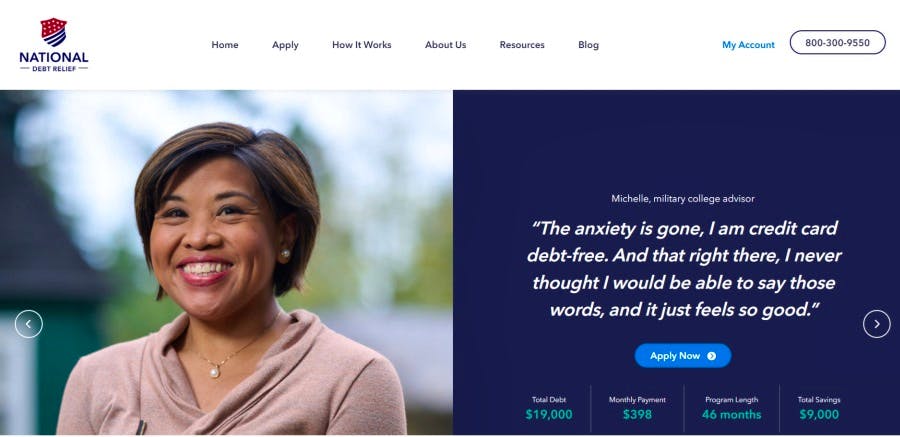
National Debt Relief is willing to work with a client if his unsecured debt is at least $10,000. The fees are the same as those of competitors, from 15% to 25% of the debt amount. Key features:
- A + rating from BBB and the Federal Trade Commission, which indicates the high reliability and security of the service;
- Free consulting of clients;
- No upfront fees;
- A wide range of debt relief types.
The disadvantages of National Debt Relief are the following:
- The company works only with unsecured debts. So, if you have secured debt and an overdue monthly payment, you won’t be able to choose from debt settlement programs;
- The settlement of tax debt relief may have a negative impact on the credit report and credit score of the client.
The company is generally trustworthy and has many clients in different US states. By contacting there, you will be able to get high-quality debt consolidation services.
Century Support Services
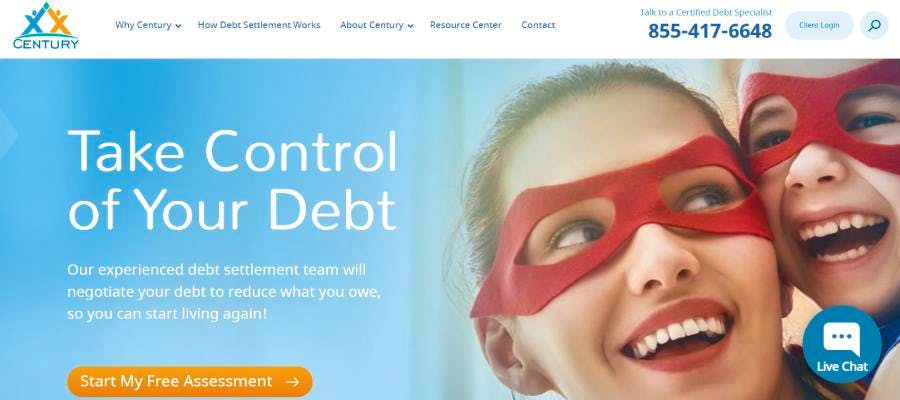
Century Support Services is rightly called one of the top debt relief companies and often even the leader of the debt relief industry, as it has effective debt settlement plans. Like most debt settlement companies described above, Century Support Services has an A+ BBB rating.
It is trusted as it quickly responds to all client requests. The support team works great. Clients can always clarify the information that interests them.
The amount with which Century Support Services works is $10,000. The fee is 18%-25% of the original debt owed. Debt settlement letters of the company are pretty effective. However, it is important to keep in mind that the debt relief effect on the credit score is not always positive. Sometimes the credit score drops significantly.
Century Support Services has many pros. But the main advantage is the reliability of the help provided. Therefore, if you are tired of debt collection calls, contact Century Support Services specialists to solve your problems.
What Debt Relief Is
The birth of a child, illness, layoffs, and wage reduction are just some reasons why a borrower may experience difficulties servicing a loan. If for a small delay in monthly payments (from 1 day to 1 month), a fine is usually charged, then for a delay of more than a month, the case is transferred to the collection department.
To solve the problem, you can get debt relief services. This implies resorting to measures to reduce or refinance the debt, which makes repayment easier.
What Are Types of Debt Relief?
There are a wide variety of methods for reducing debt and getting out of debt. The use of some of them has a less negative impact on the credit score, while the use of others may be more noticeable.
The most popular types of public service loan forgiveness are lowering the interest rate, writing off part of the principal, or combining several debts into one loan with a lower interest rate.
Lowering the interest rate on debt reduces the total amount of money that must be repaid. Writing off part of the principal debt does not mean you do not need to pay the debt at all. This implies that only a certain part of it should not be paid.
Combining several debts into one loan with a lower interest rate (debt consolidation) simplifies debt payment significantly. In addition, it does not have a negative impact on credit history. On the contrary, it helps to keep credit score in good condition.
How Do I Qualify For Debt Relief?
To qualify for debt relief, you need to follow a few simple steps:
- The first stage is the choice of a credit counseling agency. It is better to choose big companies. As a rule, debt relief conditions are more profitable and convenient there;
- The second stage is the collection of the necessary documents. Accredited debt relief companies require certain documents from applicants. These typically include identification, salary and government benefits information, past or current debt relief options, etc.;
- The third stage is the creation of a debt relief application. This involves filling out a special form, attaching documents, and waiting for a response from a credit counseling agency. It is recommended not to sign the agreement hastily. It is better to carefully study all era debt solutions, ask the experts questions that concern you, and only after that put your signature.
What Do Debt Relief Companies Do?
Debt relief companies are for-profit businesses that resolve customers’ financial problems by negotiating with creditors. They usually try to convince lenders to accept less than what they are owed, arguing that without settlement the borrower will not be able to repay anything.
Do Debt Relief Companies Hurt Your Credit?
Debt relief credit card companies are mainly focused on debt settlement rather than the debtor’s credit score. Practice shows that debt relief affect credit score not very well. Debt settlement can drop by 100 points. The record stays in the credit history for at least 7 years.
However, certain types of debt relief, such as debt consolidation, usually have a positive impact on the debtor’s credit score. Making regular monthly payments shows the debtor from the best side and an appropriate entry is made in the credit record.
Advantages and Disadvantages of Debt Relief Programs from Debt Settlement Companies

Review the pros and cons of debt relief programs in the table below.
|
Main Benefits of a Debt Management Program |
Disadvantages of a Debt Settlement Program |
|
Debtors are provided with professional financial assistance and effective money management strategies that reduce their medical bills, debt utility bills, private student loans, etc. |
There is no guarantee that representatives of the debt relief company will be able to negotiate with the creditor and the debt successfully will be reduced. |
|
Debtors no longer need to communicate with creditors and collectors and try to solve financial problems on their own. |
The debt settlement industry is subject to advertising that often misleads debtors. Therefore, it is recommended to choose an agency carefully, taking into account the fees and conditions. |
|
A new debt repayment schedule with a more affordable single monthly payment and interest rates is usually created. |
What to Know Before You Apply for Debt Relief
Before applying for debt consolidation programs, you need to understand what to watch out for. Pay attention to the interest rate, fees, and scams. Rest assured that you will be able to get quality debt free services only if you take a responsible approach and consider the key features of debt settlement.
Interest Rate
Debt consolidation loans or lines of credit and 0% balance transfer offers can provide credit card debt relief. But you should consider the cost involved. In some cases, they are quite high and can reach 6% -36% of the total debt.
Fees
There may be fees associated with some accredited debt relief options, and it is helpful to consider these when deciding whether it is worth it. For example, if you have $10,000 in debt and the lender’s fee is 20%, the debt relief company’s fee will be $2,000. Upfront fees may be required.
Scams
When you’re interested in debt relief services, whether credit counseling, a debt management plan, or debt relief, it’s important to ensure the company you’re dealing with is legit. Otherwise, you risk becoming a victim of debt fraud.
Therefore, try to choose debt relief credit card companies with a good reputation and a large number of positive customer reviews on the global Internet.
Services of Debt Relief You Shouldn’t Handle
The list of debt relief services is quite wide. This has been discussed in detail in the sections above. However, there are debt settlement programs and services you should not handle:
- The first is the government program of complete termination of debt payments. It means that you may face late payments and interest charges. If the creditor agrees to reduce the amount you owe, this does not mean that you are free and clear on this particular debt;
- The second is debt forgiveness. It is a kind of taxable income on your federal taxes. Better not to use it.
Services of Debt Relief You Can Handle: Debt Consolidation, Credit Card Debt Relief
Since the variety of debt management programs is huge, you will certainly be able to find what you need. Choose between personal loan debt relief, payday loan debt relief, consumer debt relief, credit card debt relief, debt consolidation, etc. Or ask for help from a specialist who can give you useful advices and get answers to all your questions, such as how can I consolidate payday loans.

